Anonymous
 for some violence and sexual content.
for some violence and sexual content.
Reviewed by: Jim O'Neill
CONTRIBUTOR
| Moral Rating: | Very Offensive |
| Moviemaking Quality: |
|
| Primary Audience: | Adults Teens |
| Genre: | Thriller Historical Drama |
| Length: | 2 hr. 10 min. |
| Year of Release: | 2011 |
| USA Release: |
October 28, 2011 (limited—265 theaters) DVD: February 7, 2012 |
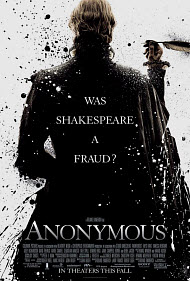

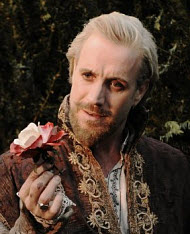
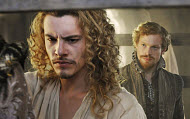
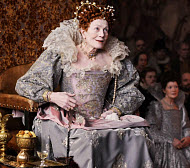
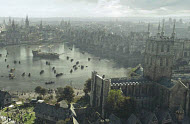
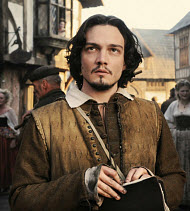
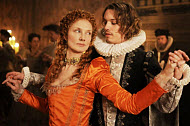
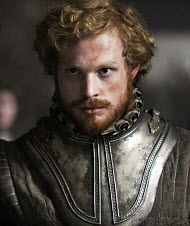
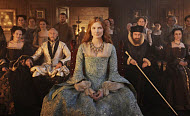
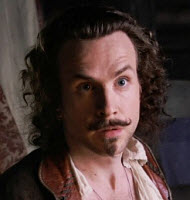
| Featuring |
|---|
|
Rhys Ifans … Edward de Vere Joely Richardson … Princess Elizabeth Tudor Vanessa Redgrave … Queen Elizabeth I Derek Jacobi … Prologue Rafe Spall … William Shakespeare Jamie Campbell Bower … Young Oxford David Thewlis … William Cecil Xavier Samuel … Henry Wriothesley See all » |
| Director |
|
Roland Emmerich — “The Day After Tomorrow,” “Independence Day” |
| Producer |
|
Columbia Pictures Centropolis Entertainment Relativity Media Studio Babelsberg Motion Pictures See all » |
| Distributor |
“Was Shakespeare a fraud?”

If the new film “Anonymous”, set in an insufferably cloudy, rainy, and stormy Elizabethan England, was not such a muddy mess, I might say that it has something, if not important, at least illuminating to say about history and about our own age. Most of the time, I tried unsuccessfully to figure out what was going on, but the mud never cleared. Internal court intrigues, external battles with the French and the Spanish armies, bouts between this Lord and that Earl, and wonders about who begot whom and who deserved a crown intersected in ways that might make an otherwise dreary history book come to life, but made this film slip and fall into one big murky puddle.
The art direction, especially the mostly computer-generated sets (courtesy of VFX-CG technology), the costumes and the makeup are a marvel, so why did I long for the old fake sets of MGM, Paramount and Warner Brothers that, although laughable by today’s standards, made a time period, however modified to suit public taste, teem with life? I am thinking of those great movies about Tudor England such as “The Private Lives of Henry VIII”, “Fire Over England”, and “The Prince and the Pauper”(the 1937 version with Errol Flynn). Those old movies did not need elaborate backgrounds; the stars and the story were scenery enough. “Anonymous” has one great performance and many good ones, but the story is as damp and dank as the old London streets in which the tale takes place.
The thesis of “Anonymous”, directed by Roland Emmerich and written by John Orloff, is that William Shakespeare was not the true author of the 37 plays that have been attributed to him and that have been the crowning works of English literature. Such a theory has been in the air for many years; books have been written about it; seminars have been put on ad nauseam to debate it; and even actors have expounded on the belief that Shakespeare’s plays had to written by someone other than Shakespeare. Well then, it must be true.
The movie opens with a hammy intro by actor Derek Jacobi, who in modern dress that is just-right shabby, complete with trimmed beard and fashion scarf, gives us a “forget everything you’ve heard before” speech to tell us that we’re about to be let in on a secret, one that’s been kept for centuries. I thought I might be in for a kind of Michael Moore or Oliver Stone history docudrama. In a sense, I was. Just as Moore and Stone do, Emmerich and Orloff lather up lots of drama but go foamy on the real stuff.
“Anonymous” takes the view that the Shakespearean plays were written by Edward de Vere, the 17th Earl of Oxford. Edward is a nobleman by birth and a favorite of Queen Elizabeth I, in her bedroom as well as in her council room. Because a 16th Century Earl would never stoop to as crass a career as playwriting (I did wonder why no one asked the Earl why his fingers were always stained with ink; perhaps the stains came from all the love-letter writing to Queen Bess), and the plays often poked fun at figures in high positions at a time when the country’s Queen had a penchant for sending anyone who dissed her to the executioner’s block, playing a ghost writer seemed to be the safest bet.
William Shakespeare (Rafe Spall) is portrayed as a drunken, thieving, cavorting, opportunistic dolt, a third rate actor incapable of putting pen to paper. He could read scripts, but could not form letters with a pen. He could barely speak. When told that “his” plays will be published, he responds, “you mean, like, in a book?”. He’s a fraud, and a pompous one at that; he’s the Milli Vanilli of Elizabethan England.
Granted, we do not know a lot about Shakespeare’s life, and it is certainly a mystery how a man, a common man, an itinerant actor and son of a shoemaker, could write the way he wrote, how he came to create some of the supreme masterworks of Western Civilization. The fact that there is an apparent divide between the urbanity of the man and the glory of his work leads some to wonder at the enigma of genius and others to speculate that something else must be afoot.
Great writers sometimes come from the upper classes, but many times they do not. What did a tax collector named Matthew or a fisherman named John know about literature? What royal families were they raised in? What creative writing classes did they take? Where had they been previously published? Granted, another force was at work in the gospels which is God’s writing transcribed by man. However, each gift, be it literature, music or performing talent is a gift that comes from above, and it is not up to us to determine how it gets doled out, and why. Shakespeare’s gift was not just a blessing for him; it has been a blessing for all of us.
One thing the movie gets right is the immediacy and the power of the bard’s words. Watching the faces of the spectators in the Globe theater listen to the “To Be or Not to Be” soliloquy from “Hamlet” or the St. Crispin’s Day speech from “Henry V” reminds us of what great words can do. Elizabethan audiences, mostly commoners, were hearing those words for the first time, crowded into seatless spaces as rain poured down on them through an open roof. They were moved in ways that we still are today, and that is the magic of Shakespeare’s genius. We may have seen “Hamlet” or “Macbeth” or “As You Like It” twenty or so times, yet the words in those plays always move something in us as though we were hearing them for the first time.
It was also a joy to watch theater as it existed in a time when it was a living and breathing art form in which audiences participated directly with the actors, egging them on, hissing at villains, shouting out stage directions, and even throwing things onto the stage. Oh, to have such an option today, to be able to throw a vegetable or two onto the stage of a Broadway play where I am told to shut off my cell phone, to refrain from opening a candy wrapper and to show respect for the performers whom I am paying $100 to watch!
Genius is not a function of how and where we were born, or what we come to know or achieve in life. It can only be described as a gift from God. Shakespeare’s heart, and his pen, were touched by something that most of us do not understand. I don’t know how genius is imparted. The gift of genius for me is best depicted in the painting by Caravaggio, “Saint Matthew and the Angel”. In the picture, Matthew seems unable to put pen to paper; he can’t even sit comfortably at his desk; instead, he clumsily straddles a small stool. An angel comes from above. She has brought something invisible in one hand that she has received from above, and she is transferring that something to her other hand which she will then give to Matthew. That is genius being born.
Royalty and nobility do not exist in the U.S., nor even in England, for that matter, where they have sadly become museum pieces that are kept behind glass. We have replaced kings and queens with Hollywood figures, and our royal personages are now the stars of film and reality television. There is certainly a hierarchy of talent in the arts and with it too often comes a sense of birthright. It is no surprise that Shakespeare’s life, unfestooned and by all appearances unpolitical, would have its merit and its meaning questioned. Jacobi’s winded intro could easily be summed up as: “This is a man who was not one of us. Let us find someone who is.”
A subplot that becomes less sub and more main attraction confuses more than it enlightens. Edward has been brought up in the house of William Cecil and his son, Robert who happens to be a hunchback, just like a certain king in a certain play. The Cecil house is a miserable place to live but it’s not all bad, because material lurks everywhere for a would be writer. Why young Edward even has servants spying on him from behind curtains, and he kills one of them by sticking a sword through a curtain! Sound familiar? To avoid retribution for killing the servant, Edward is forced by Cecil Senior to marry Cecil’s daughter. He does so, but the marriage is an unhappy one.
His affections then turn to the not so “Virgin Queen”. The two have a child together, who is brought up without the Queen’s knowing the boy’s whereabouts, although Edward keeps track of his son who becomes Henry, the 3rd Earl of Southampton. Henry supports a rebellion led by Robert Devereux, the 2nd Earl of Essex and another illegitimate son of Queen Elizabeth by another man (her out of wedlock male children keep increasing in number throughout the story), to seize the crown and ultimately prevent James I, the son of Mary, Queen of Scots, from being brought to throne after Elizabeth dies. Dizzy yet? I know I am, almost as much as I was when I was watching the film, and I am not even revealing the final twist which convolutes everything even more, and further sullies the reputations of all the real life characters involved, especially the Queen. When the movie implies it has secrets to tell, they weren’t kidding. How true those purported secrets are is another matter.
Commoners fare little better than the nobles. Ben Johnson (Sebastian Armesto) is portrayed as complicit in the fraud to have someone else be a frontman for Edward de Vere. Christopher Marlowe is mysteriously murdered, and Johnson accuses Shakespeare of the deed. So I suppose we can add “murderer” to William Shakespeare’s list of character defects. Will was able to swindle a good deal of hush money from the ever more short on cash de Vere which he used not only to carouse but also to fund the construction of the Globe Theater. It seems surprising that as stupid a figure as Shakespeare is portrayed to be, he had the stuff to build, promote and maintain one of history’s great theaters.
Edward is played by three different actors at three different stages of life. That got confusing, too. The adult Edward is well served by the long faced, keen eyed Rhys Ifans, even when the script has him saying stupid things: “all art is political… otherwise it is just decoration”. No actor could make that line sound right. If art doesn’t rise above politics, what good is it? David Thewlis and Edward Hogg are deliciously banal and treacherous as the father-son team of privy chamber counselors, William and Robert Cecil. Next to them, Richard III would seem cuddly. However, the prime acting honors go to the mother-daughter team who play the Queen. Joely Richardson plays her stunningly as a young woman who comes to the throne with confidence and passion, perhaps a bit too much passion.
But it is Richardson’s mother, Vanessa Redgrave, who steals the show as the aging and dying Queen Elizabeth. As both ruler and woman. she is not afraid to show how human suffering affects everyone, even a queen, and how that suffering has a face. She shies away from nothing, even senescence. There is a great scene in which she drops not onto the seat of her throne, but onto its foot, as her countenance reveals how heavy the crown is that sits upon a ruler’s head.
“Anonymous” is a heavy load, as well. And it would take a lot more than this grim and grating tale to convince me that someone other than William Shakespeare wrote the plays that I believe will continue to be attributed to him. And rightfully so. What makes a genius is indeed elusive. Just as elusive as what makes a movie magic.
Violence: Moderate / Profanity: Moderate / Sex/Nudity: Moderate


PLEASE share your observations and insights to be posted here.



My Ratings: Moral rating: Offensive / Moviemaking quality: 4